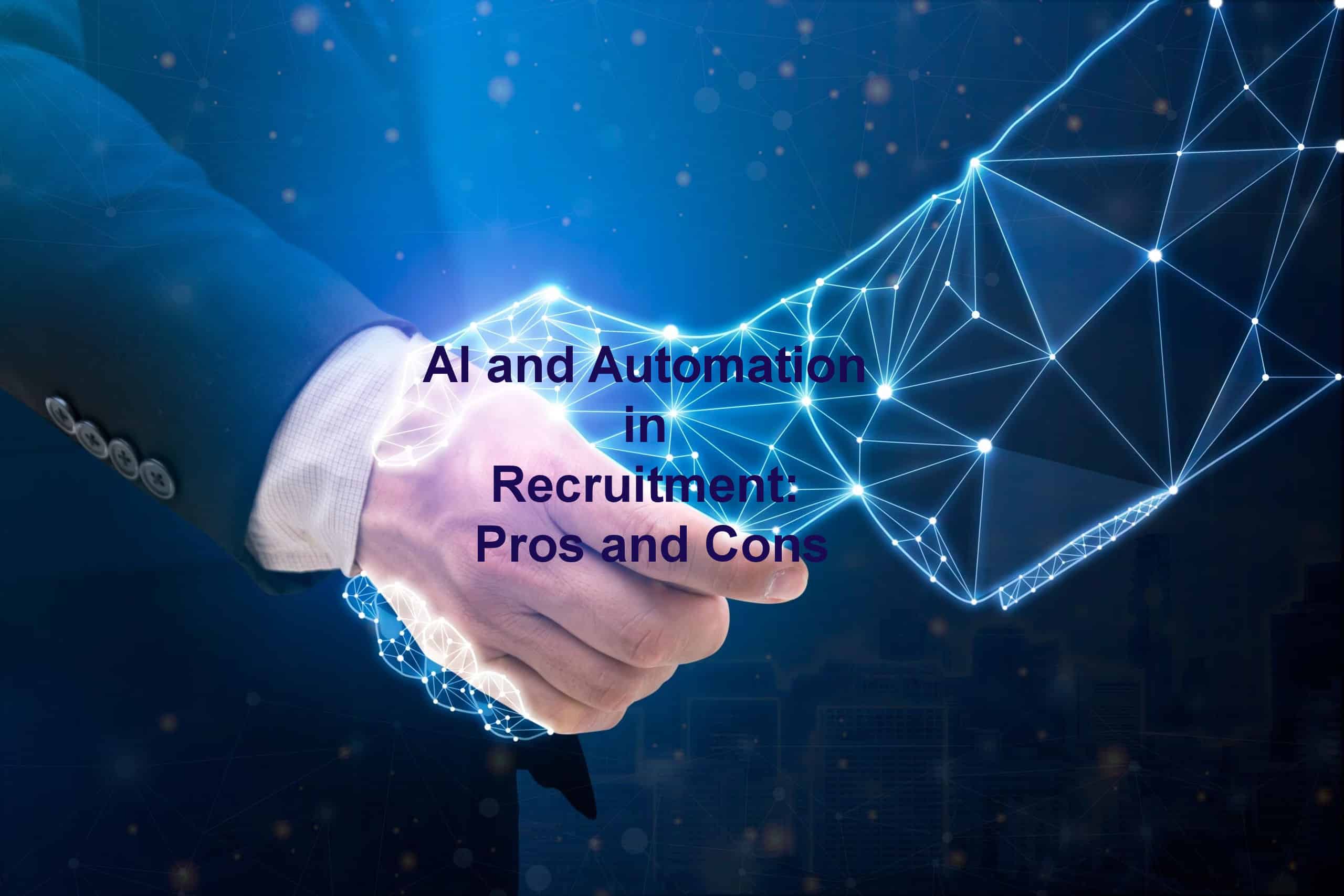El proceso de reclutamiento has experienced significant changes because of rapid market conditions and technological improvements in artificial intelligence (AI) and automation systems.
Today staffing agencies adopt these technologies to optimize recruitment procedures and deliver better candidate interactions while supporting better decision-making.
The significant advantages of using AI and automation in recruitment exist alongside various substantial challenges and possible negative outcomes during recruitment processes. This blog examines both sides of the coin.
Recruitment Processes Benefit from AI and Automation Technologies
The recruitment process integrates AI and automation through various systems such as:
- ETA enables automated application sorting and filtering through set criteria.
- Chatbots enable real-time candidate communication for both answering basic questions and performing initial screenings.
- Predictive Analytics evaluates historical hiring data to determine which characteristics match new role requirements.
- Resume Parsing uses automated methods to extract key information from resumes during screening
These technologies focus on reducing recruitment time and workload so staffing agencies can concentrate on strategic recruitment activities.
Advantages of Using AI and Automation in Recruitment Activities
-
Improved Efficiency
Recruitment efficiency increases substantially through the implementation of AI and automation technologies. Thousands of job applications receive automated processing through systems which operates much faster than human recruiters. Staffing agencies gain faster hiring capabilities through automated recruitment processes that enables them to handle bigger candidate pools.

-
Enhanced Candidate Experience
Chatbots enabled by artificial intelligence offer prompt answers to candidate inquiries thus enhancing their entire job seeking experience. Staffing agencies that implement real-time candidate interactions create a perception of value and information delivery to applicants.
-
Data-Driven Decisions
The analysis of large data sets by AI systems reveals patterns which allows recruiters to base their decisions on accurate data. Staffing agencies use predictive analytics to analyze candidate potential for specific roles which helps them avoid unsuccessful hires.
-
Reduced Bias
AI demonstrates the capability to decrease unintentional discrimination during recruitment through proper programming. AI tools operate by evaluating skills and qualifications which helps to create an inclusive and diverse recruitment proceso.
Cons of Leveraging AI and Automation
-
Loss of Human Touch
AI and automation in recruitment result in a major disadvantage through the elimination of personal human interaction during the hiring process. The proceso de contratación requires candidate relationship development yet excessive technological dependency results in un-personalized connections.

-
Over-Filtering Candidates
AI systems function based on the quality of training data they receive. Poor algorithm design creates a situation where candidates get filtered out excessively because of specific selection criteria thus eliminating qualified applicants. The absence of qualified minority candidates and other diverse talent groups in the workforce occurs due to these hiring practices.
-
Data Privacy Concerns
AI-based recruitment systems handle numerous personal records of applicants. Staffing agencies need to meet GDPR requirements and other data protection standards to protect candidate information from potential harm. Legal consequences and loss of client trust emerge from any data breach or improper use of information which affects the agency’s standing.
-
Dependence on Technology
The efficiency improvements from AI and automation generate technological dependencies which reduce problem-solving abilities. Staffing agencies experience difficulties adapting to situations where technology fails to deliver accurate results because they lack necessary human expertise.
AI and Automation Best Practices for Successful Recruitment Implementation
Staffing agencies can effectively handle both advantages and difficulties of AI and automation in recruitment by implementing the following best practices:
-
Use Technology to Enhance Human Intelligence.
While AI has the potential to help with some tasks, people make decisions and people have instincts that are much better than a computer’s. Recruiters should see AI tools as tools to help them with their job rather than as tools to replace them. For example, use AI to screen resumes and do initial assessments, but have a seasoned recruiter be the one to make the final decision on who to bring in for an interview and who not to.
-
Frequently Update Algorithms and Data.
To prevent bias and over filtering it is important to check and update the AI algorithms from time to time. This is where the importance of constant checking and improvement of the data sources comes in so that the AI system is actually assessing candidates on the right and appropriate criteria that are in line with the agency’s diversity and inclusion agenda.
-
Prioritize Data Security
The more that AI and automation are being used, the more candidate data needs to be protected. Staffing agencies must put their money where their mouth is and put in place good cybersecurity measures and follow data protection regulations. Putting in place data governance policies will help to build the trust of candidates and clients.
-
Train Staff on AI Tools
It is therefore crucial to ensure that everyone is well equipped to harness the power of AI and automation. It is important that recruiters are able to utilize these technologies effectively. It entails understanding how to make sense of the AI reports and knowing when to disagree with the machine and use one’s own discretion.
-
Keep the Candidates Informed and Involved
In the recruitment process, it is important that the candidates are informed of the use of the AI. Make sure candidates know how they will be affected by AI during the application process. Giving candidates an idea of what happens in the automated part of the recruitment process can help them feel more at ease and less threatened by the use of machines in the recruitment process.

-
Gather Feedback and Adapt
Once the AI and automation tools have been put in place, it is important to collect feedback from the recruiters and the candidates. This information can give one an idea of the effectiveness of the technology and the entire process. Use the feedback to make changes that will help improve processes and make them better.
Looking Ahead: The Future of AI in Recruitment
As AI technology advances, its use in recruitment is only going to get more complex. Some of the trends that have been identified include: The use of advanced predictive analytics which gives a better understanding of candidate behavior and the use of natural language processing which can help improve the interaction between candidates and AI systems.
Moreover, as companies continue to focus more on diversity and inclusion, AI tools will have to be able to support these efforts more effectively. Solutions that can help with equal opportunity and minimize bias will be very crucial for companies that want to create diverse teams.
Conclusión
The use of AI and automation in recruitment has its advantages and disadvantages for staffing agencies. The benefits of efficiency, better candidate experience, data driven decision making and less bias are quite convincing. However, there are also the risks of dehumanization of the recruitment process, candidates being filtered out, data protection, and overuse of technology.
As the recruitment industry continues to change, staffing agencies will need to find a way to harness the power of AI and automation while still keeping the human element that makes recruitment an art and a science. In this way, agencies can use technology to their advantage and at the same time meet the requirements of clients and candidates.


